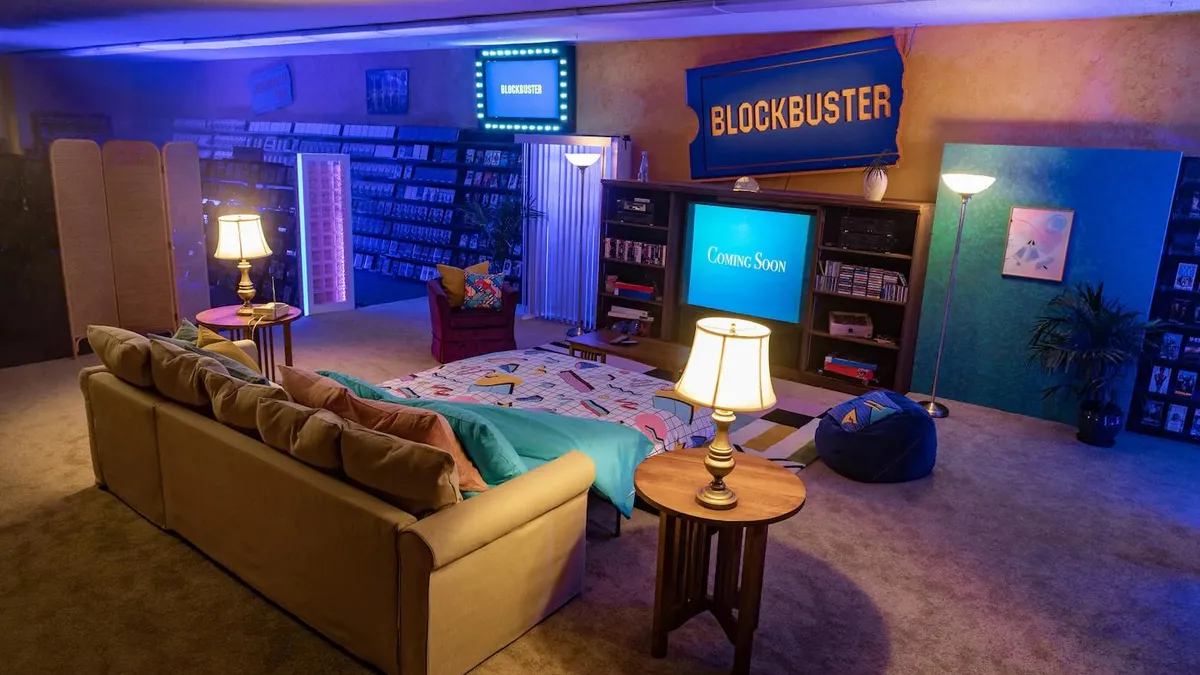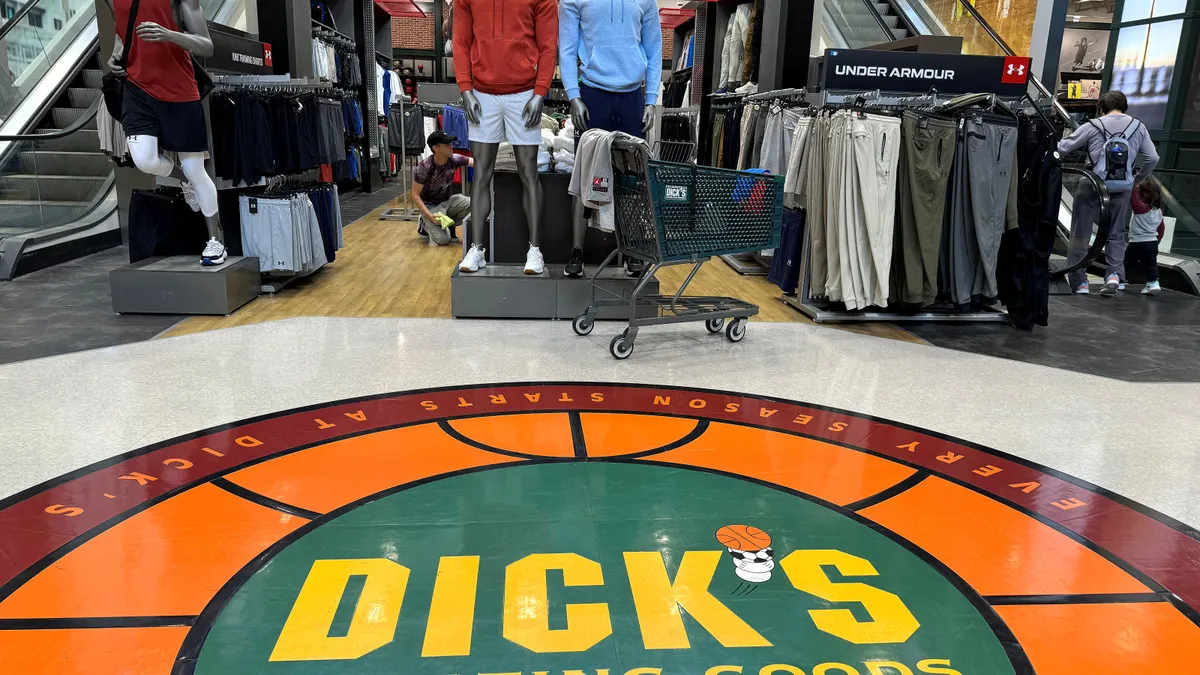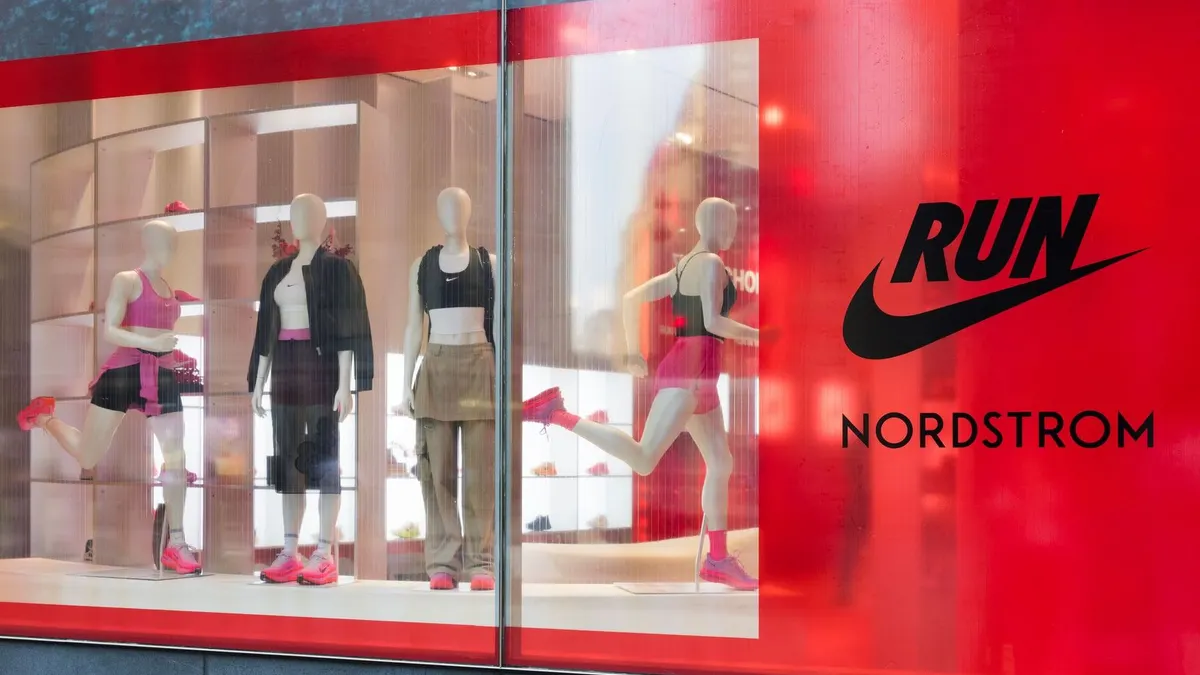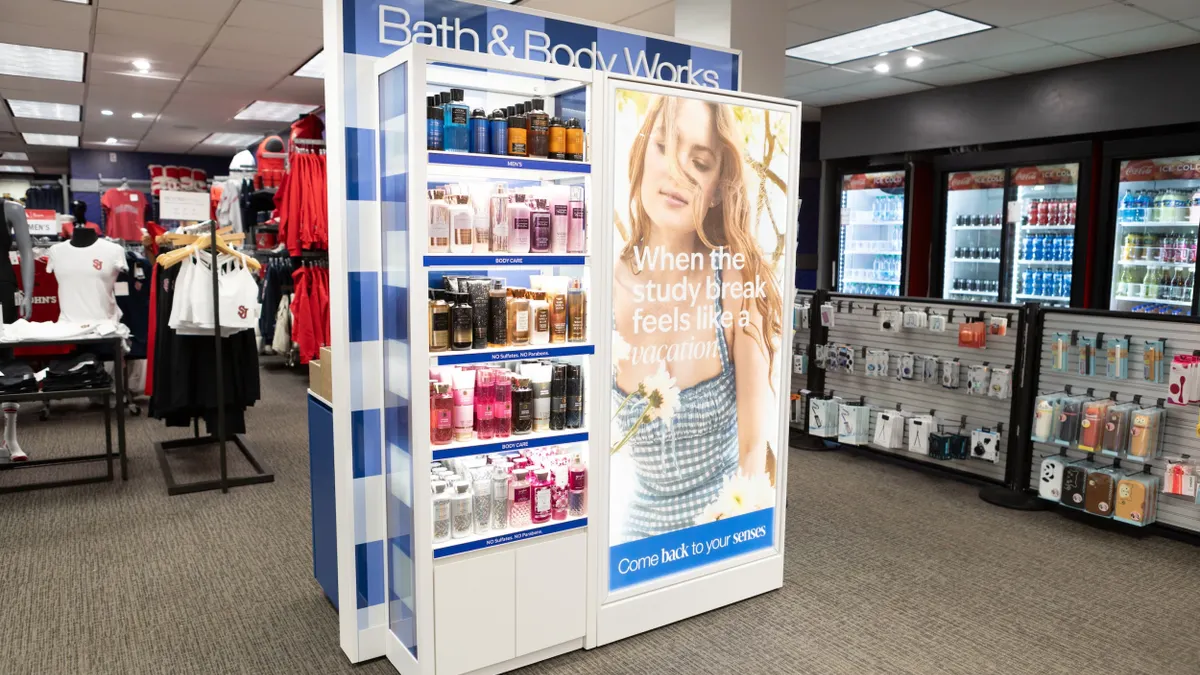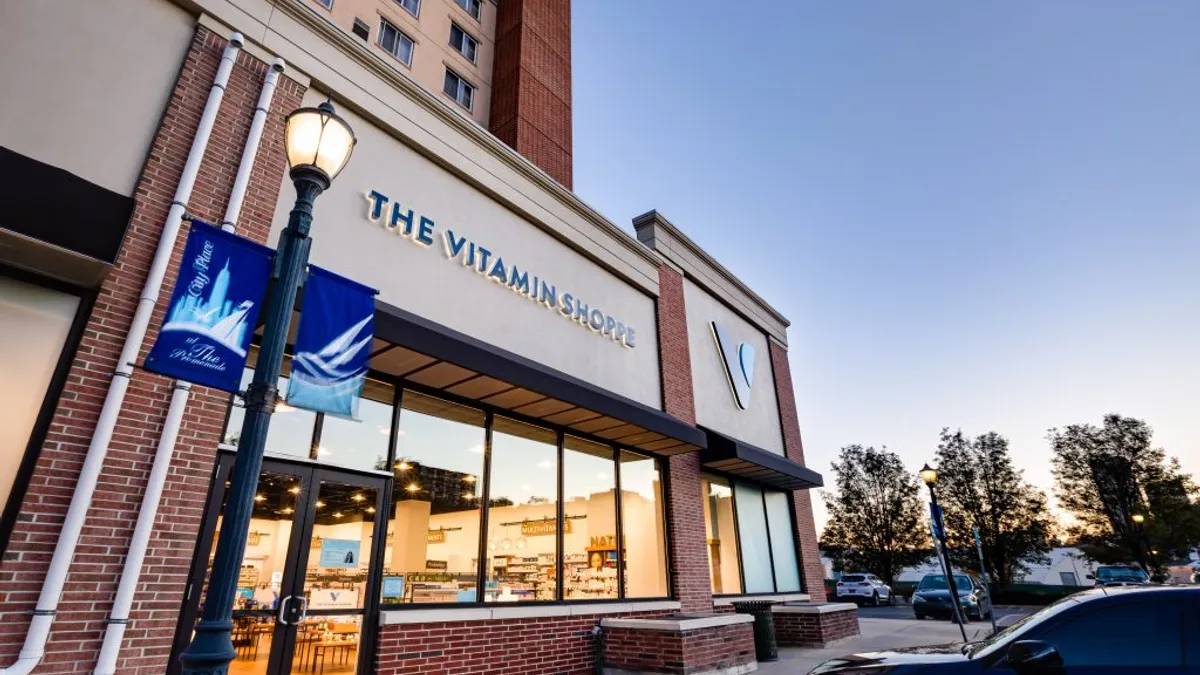The Blockbuster brand has had a weird life. And it's only gotten weirder with time.
The brand might not have existed at all but for a disagreement about a color scheme. David Cook, an oil industry veteran and data systems guy, left a video rental franchise when he was told he couldn't use a blue-and-gold design theme created by his wife. Cook started his own video store, opening the first Blockbuster in 1985.
This was fairly early in the life of the video rental industry. A wealthy waste disposal mogul would take Blockbuster the brand and meld it with a frenzied, McDonald's-esque expansionist strategy. Ascendance, dominance, corporate decay, decline and bankruptcy all unfolded over the quarter of a century following Blockbuster's birth.
At a price tag of $320 million, Dish Network bought Blockbuster and its brand out of bankruptcy in 2011.
Blockbuster still at that time had 1,700 stores, which the satellite TV company planned to use to sell its products. Around two years later, Dish would close all of Blockbuster's corporate stores. The company's initial plans for Blockbuster obviously failed while it continued poking at the brand, trying ways to tie it to on-demand video services.
"There was very little risk in buying," Dish co-founder and chairman Charlie Ergen told Bloomberg of the Blockbuster acquisition in 2012, when Dish had begun to abandon its initial strategy for the video retailer. "Worst case we break even or make a little bit of money."
As the decade played out, all Blockbuster franchise stores would close too, until, today, there is only one left in Bend, Oregon. And that's where things get really odd for the brand.
With a precarious foothold on existence, Blockbuster has taken on a new life. Visitors have flocked from all over the world to the last store. In the past year, a new book and documentary about the company have been released. People seem to appreciate the brand, as a brand, more now than when it was tied to an actual chain of video stores.
All of this is happening at a time when marketers and financiers have turned brand properties themselves into commodities. Intellectual property divorced from the original operation it symbolized — and often divorced from any operations at all — is bought and sold. Bargain hunting for IP in retail bankruptcies are companies like Authentic Brands, Iconix Brands and Retail Ecommerce Ventures.
What to do with the brand of a dead retailer? Imagination and consumer interest are the only limits, really. The name of FAO Schwarz, the once-iconic toy store, has in recent years appeared on products everywhere from Marshalls to Barnes & Noble, and is back in physical store form. Radioshack is an online store today after multiple attempts to save some sort of footprint. The Juicy Couture brand, a one-time favorite among celebrities of the 2000s, is seemingly unkillable.
In that environment, it seems like there is some way for Blockbuster's life as a brand, if not a store, to continue on. So what is Dish doing with the Blockbuster brand today? As a corporation, not much that I can see.
Dish declined to answer most of the questions I had about the Blockbuster brand and the company's strategy around it. In an emailed statement, the company said only: "Today, we license the Blockbuster brand to various apparel and games manufacturers, as well as to the store in Bend, OR. In addition, we are actively exploring additional licensing opportunities."
But what all could be done with the Blockbuster brand, and is there any actual value left in it? That's what I want to know.
Free Blockbuster
I had my own small role in the brand's life, for better or worse (for both Blockbuster and me).
In the early 2000s, I worked at the busiest store in one of Blockbuster's largest franchises. The brand, for me, is tied up with work: busy nights, irate customers and weird capers (exploding fire extinguishers, hunting down unreturned movies, customers who accidentally dropped off their personal adult films inside our rental cases).
It's also tied up with my youth from the time I worked there — weird friends, adventures that began or ended with meet-ups at the store, doomed crushes on customers and coworkers. All of it happened surrounded by that blue and gold color scheme.
By no means am I alone. Tens of thousands of us donned khakis and polos with that signature ticket logo stitched on. We were the tiny, millipedal legs of the brand.
I'm also not the only former Blockbuster employee who can't quite let the brand go. Brian Morrison, like me, worked at a Blockbuster as a young adult and — as I wanted to but didn't — moved to the Los Angeles area to pursue a career in the entertainment industry.
"For a lot of us who were out there in the suburban United States who were into movies, you could work at the movie theater or you could work at a video store," Morrison said when we talked in September. "We found a lot of like-minded folks."
In 2018, Morrison had an idea that combined the Blockbuster brand, some old DVDs of a friend who was moving and newspaper boxes left vacant after a Los Angeles alternative weekly shut down, and spliced all of those elements together with one of the flat-out nicest ideas of all time: the Little Free Library.
If you're unfamiliar, Little Free Libraries are those tiny houses on stands that facilitate book lending among neighbors. Morrison created a "Free Blockbuster" out of the abandoned L.A. Weekly stand and his friend's DVDs. "We've got all this industrial blight that's just collecting trash on the side of the road. My friend's got a bunch of DVDs that she's just going to give to Goodwill," Morrison said. "And I'm like, 'We should call it a Free Blockbuster.'"
A friend of Morrison's had already tried a similar free movie box but called it the "Video Honor System," which is apt to the concept but not as snappy and nowhere near as recognizable as "Free Blockbuster." Of the concept, which is now the basis of a nonprofit, Morrison said, "What really makes it sticky is that Blockbuster reference."
I first learned of Free Blockbuster this summer when a coworker sent me an article via Slack about one in Northern Virginia. I messaged back: "a) that is very sweet … b) I wonder if they have to pay royalties to Dish."
My assumption, without thinking about it, was that Dish had nothing to do with Free Blockbuster. There's certainly no reason why a for-profit corporation couldn't launch a free movie borrowing platform for neighbors as a branding exercise, or spin off a nonprofit to do the same, also as a branding exercise. But based on a decade of history of Dish's ownership of the Blockbuster IP, it seemed safe to assume it had nothing to do with Free Blockbuster. Which turns out to be correct.
When Dish found out about the Free Blockbuster, its legal department moved to shut it down. In November 2020, senior corporate counsel handling IP matters for Dish sent Morrison a letter that included side-by-side images of the Blockbuster Logo and Free Blockbuster logo. Such visuals are the stuff of trademark lawsuits.
"While we are certainly flattered by your affection for the brand, we also have to be diligent to ensure that the Blockbuster Marks are used correctly," wrote Dish's lawyer, Max Gratton. "If we allow uses like this one, we run the risk that our trademark will be weakened."
Gratton went on to write that "to resolve this matter, we simply request that you change your logo and name to avoid use of the Blockbuster Trademark or torn ticket logo, and expressly abandon your trademark application for the FreeBlockbuster logo."
Morrison called Gratton after receiving the letter. "'I get it, you have to protect your marks,'" Morrison recalled saying. Gratton responded to the effect of, "'Well, just do it under a different name.'"
"I could do that, but it's not going to be the same," Morrison said. "It's not going to have the same resonance for people."
Morrison asked if Dish would license out the Blockbuster trademarks to Free Blockbuster. Gratton, according to Morrison, said essentially that the matter was above the lawyer's pay-grade and would check further up in the company. Nearly a year went by without any word from the company.
When I called to chat in late October, Gratton referred me to Dish's media team, which, at that point, I had already been trying to reach for well over a week. Then, the day before this piece was to publish, after a few more messages left with the media team, Dish responded. The company said "we are discussing the possibility of a licensing agreement" with Free Blockbuster. Morrison also noted an email from Gratton, sent the same day as Dish's reply, opening a conversation around a license.
'The Magic of Blockbuster Video lives on with Dish'
There is nothing unusual about a corporation protecting its trademarks and other IP. The irony to me — a rather bitter one as someone who feels he has his own tiny share of sweat equity in the brand — about Dish's attempt to halt the branding of Free Blockbuster is that Dish seems to care so little about the Blockbuster brand today. The name is mentioned nowhere in the company's 10-K these days, suggesting it's a negligible part of the overall business.
Go to Blockbuster.com today and the site tells you that "BLOCKBUSTER.COM®" is where "the Magic of Blockbuster Video lives on with DISH." Clicking a link on the page just routs you to Dish's site for its programming packages — there's no other trace of the Blockbuster name. Maybe Dish gets a decent amount of traffic from internet surfers looking for the old Blockbuster. Maybe not.
Dish also had a "Blockbuster @Home" channel package, which years ago was rebranded the "Dish Movie Pack."
The company has, perhaps more recently, used a surge in nostalgia around the Blockbuster brand to push its Sling TV service. A page featuring the two tries to tap into Blockbuster nostalgia with a "Flashback Friday" promo.
"Remember the good ol' days of heading out to Blockbuster on a Friday night, grabbing some theater snacks and having a movie night in with your friends and family?" the site reads. "Relive the nostalgia in a much more convenient way with Blockbuster Flashback Friday movie night on Sling."
It's not clear when the page went up, or why, or how it has been promoted by Dish, or how much traffic it's received. Internet archival site Wayback Machine didn't first register it until 2020. Once again, click on any link on that page and you're whisked away to Dish sites that make no mention of Blockbuster.
Being a funnel to Dish subscriptions makes the brand seem "pretty darn useless/unused," Dan Herbert, associate professor at University of Michigan's film and television department and author of a book about video stores, said by email. But, Herbert added, "I don't know what would be better."
The company's last store did become the site of an Airbnb for a few days last year, but that was a marketing stunt led by Airbnb. The store's owner, Ken Tisher, told me last year that Airbnb approached the store. Dish appears to have had no role aside from allowing it and not kiboshing it.
The Bend Blockbuster also has its own webpage that includes an online store with Blockbuster merch like T-shirts, keychains and even a laminated membership card (good lord, I made so many of those!). Again, it's hard to know what role, if any, Dish has in that or how much money it makes. My best guess is zero of the former and nearly zero of the latter, relative to the corporation's income statement.
In recent years, a couple of pop-ups launched under the Blockbuster name, but once again it's hard to know if Dish did much besides presumably signing an agreement and collecting a check.
To recap, a communications technology and services company owns the Blockbuster IP but doesn't use it to brand any of Dish's services or technology, only promote them — and even that it does rotely and sparsely, from everything I can gather. The question I have had for years, and have never gotten a satisfying answer to, is: Why does Dish even still want the Blockbuster IP at this point?
No one can answer that but Dish.
'Tai's Video Streaming Service'
But does anyone but Dish even want the brand? That might be the more interesting question.
The answer is: yes. I found at least one person in the world interested in buying it.
Tai Lopez is executive chairman of REV — the recent buyer of the Stein Mart, Pier 1, Modell's Sporting Goods, RadioShack and other retail names, all of which the company has converted into online pure-plays. Lopez and I talked over video chat in September, in a conversation that spanned LeBron James, Mark Zuckerberg, Napoleon, Circuit City, Netflix, Friendster, Hanlon's razor (cousin to Occam's razor), and movie production, among other topics.
Also during our chat, Lopez told me that he would buy the Blockbuster IP, if it were up for sale and at the right price.
Lopez has asked David Peress, executive vice president of Hilco Streambank, which handles IP sales and valuations, before about how to buy the brand. So far, according to them, it hasn't amounted to much beyond a drink and a conversation.
"In the last year I started thinking it through," Lopez said. "What's the brand that had almost monopolistic sway on consumers? Number two, what's a brand that still has nostalgia? Because there's some brands that used to be monopolistic that nobody even likes."
He added: "So Blockbuster for sure has nostalgia, and it was monopolistic. When you told somebody I'm going to the video store, eight times out of 10 you were going to Blockbuster."
Obviously, Lopez hasn't succeeded in acquiring the brand from Dish yet. Were he to, Lopez said he would use it to create a streaming competitor to Netflix and others. Not only that there is room for another streaming service, in Lopez's view, but Netflix's day will come. "Nobody survives because eventually business mindsets get old, and they stop adapting," Lopez said. "Netflix won't win in the long run."
He pointed out that other streaming services, including Netflix, HBO, Disney+ and others, hold a lot of proprietary content. Finding a niche then becomes critical. "The entry point, the tip of the spear, maybe something like indie, maybe something like family, those types of niches," Lopez said. "I would build a loyal cult-like following around that, and then I would expand to go full bore against Netflix."
Lopez, who also produces films and has lived in Hollywood, thinks there may be some some inroads to be made with filmmakers and production companies with a different payment model than what Netflix offers. And putting Blockbuster on such a service would get it a lot further than something like "Tai's Video Streaming Service" (his example), just as "Free Blockbuster" gets a lot more attention — including from corporate IP lawyers — than "Video Honor System."
I also asked Lopez if he would tie the IP to any sort of brick-and-mortar entity. Lopez said he would, in the form of video vending machines (such as Redbox) or store-in-stores such as at Walmart, depending on the ultimate target niche he would pursue.
So how much is the Blockbuster brand worth to someone actually interested in buying it? At various times in our conversation Lopez — who obviously is not disinterested here and has every incentive to lowball — dropped three different numbers. He said, initially, that he would pay $1.8 million for the brand. That's less than a third of what Lopez's REV paid for the Stein Mart brand. Stein Mart! Ouch.
Someone with high risk tolerance might pay upwards of $10 million, Lopez added. In the absence of YouTube, Lopez said he'd pay $30 million for Blockbuster. That's because Lopez considers YouTube, known best as the world's main proliferator of amateur videos, to be a sleeping beast in streaming movies and TV.
So, just kill off one of the biggest content engines ever produced and Blockbuster begins to be worth sort of serious money.
'Just checking in' (for the first time in six years)
The existence of a possibly interested buyer is one answer to the question: Is there value left in the Blockbuster brand?
I also put that same question to a couple of firms that measure consumer engagement with brands. According to Brandwatch data, the volume of social mentions of Blockbuster has been steadily increasing over the past decade since 2011, with some sharp spikes in recent years.
Brandwatch found a strong correlation between Blockbuster and streaming service conversations, with around 2 million mentions containing Blockbuster as well as one of the top streaming services. That could potentially support Lopez's idea of tying Blockbuster to a streaming platform of some sort.
There's plenty more to the story, though. Brandwatch's Kellan Terry noted that more than half of the company's Twitter mentions since 2011 revolved around just two tweets last year from Blockbuster's account (which is the property of Dish, and is not to be confused with the hilarious and cathartic The Last Blockbuster Twitter account).
The first tweet was a simple salutation: "Just checking in." That one tweet, from Aug. 11, 2020 — after years of silence from the brand — garnered more than 900,000 likes and more than 100,000 retweets. The second, from just hours later, was a cheeky "OK, we've seen enough. Checking out." It got more than half a million likes.
Just checking in. ????
— Blockbuster (@blockbuster) August 11, 2020
"If you're asking, 'Do people still care about this brand?' The answer is simply: yes," Terry told me in an email. "The massive amount of engagement on two tweets from the brand account after being dormant for six years (the last tweets from that account were previously from January of 2014) is a good first indicator, but there is much more to it."
Terry described Blockbuster as having "meme" status. And lest you think memes can't make money, Terry pointed to Crocs, which is making unholy amounts of money while doing things like making clogs that can double as ranch dressing serving containers.
"Nostalgia is the single, most-powerful feeling on the internet," Kellan said. "The Blockbuster brand has value, and a lot of it, but it needs to realize that every other industry is looking to capitalize on nostalgia, too. Just like any other product or marketing strategy, it's all in the execution. If Blockbuster is looking to make a comeback, it needs to realize that a misstep here would be catastrophic and destroy all that goodwill."
Offline, the Blockbuster brand's interaction with the world is also complicated. According to Engagement Labs, a data and analytics firm that provides social intelligence, word-of-mouth mentions around Blockbuster have been steadily and significantly declining since 2007. Which is perhaps not surprising.
Interestingly, though, the sentiment scores started to increase starting in 2013, the year Blockbuster closed its last corporate stores under Dish. Since then, sentiment has improved from a score of -20 to positive 14. In other words, people's feelings for Blockbuster turned positive once its stores were gone.
Social chatter isn't everything, though. Blockbuster had influence and cache not just in the minds of consumers but also to the entertainment industry. Blockbuster was a major channel for movie studios, which weren't always enthusiastic about the relationship.
But that was long ago already. "As a clothing line, bumper sticker line, nostalgia merchandise line... it's doing well," Taylor Morden, director of "The Last Blockbuster" documentary — which explores the rise, fall and ultimate cultural meaning of Blockbuster — said by email. "Unfortunately it's no longer associated with the entertainment industry in the way that it once was so it might be impossible to revive as a go-to stop for all the newest movies."
The Blockbuster family fun center
The Blockbuster brand exists in a kind of purgatory. Nostalgia has kept it alive in the popular mind, for now. Every video store closure — such as the wind down of the sector's very last chain, Family Video, this year — throws that nostalgia into relief. But nostalgia alone can't fuel Blockbuster forever.
It has to be attached to something, something of scale and quality, especially if and when the Bend store finally closes someday. The brand must find its way to a second life, or fade away quietly and probably forever.
I wanted to know what was the full range of possibilities for a renewed Blockbuster brand, so I asked around for ideas. What would you do if you controlled the Blockbuster IP, and had some money to throw at it? I asked. Here are some of the answers I got:
Brian Morrison, secretary of Free Blockbuster:
"Imagine if you can go to this place and there's movies, and maybe a little theater, but there's also an arcade that's all movie and television IP. I see it as a Dave and Busters. I think they tried to become a Netflix, to digitalize. They should have leaned into what they were, which was a physical space. Dave and Busters is my answer — Blockbuster family fun center."
Taylor Morden, director of 'The Last Blockbuster'
"What would I do with the brand? I think some kind of film aggregator that pulls from any and all sources for movie streaming as a one-stop-shop would be pretty cool. Something experiential, you could go in, get tailored movie recommendations, add those rental movies to some kind of digital Blockbuster card that you can take home to unlock a digital rental. Combined with a line of retail 80s/90s nostalgia stores. Selling popcorn, candy, soda, t-shirts, posters, and VHS copies of all the latest hits."
"Would that be profitable? probably not. Would it be rad? yep."
Dan Herbert, professor and author
"In the 1990s, Blockbuster experimented with these video arcade/indoor amusement park places, that had virtual reality games, a jungle gym for grown-ups, and things like that. Called Block Party or something. COVID pandemic aside, I wonder if the company could invest in more experiential spaces like that? Clearly Block Party failed, but I wonder if the conditions for adult novelty entertainment have changed (or will change post pandemic). Sell beer and pizza. This is probably a terrible idea, but the current situation doesn't seem much better. Other than that, I would see them buying up all the spaces vacated by Family Video — that would be a horrible and ironic twist, and just squeezing out a few more years of the physical media rental market that exist in those neighborhoods."
Alan Payne, former Blockbuster franchisee and author of 'Built to Fail: The Inside Story of Blockbuster's Inevitable Bust'
"When Dish bought it, Chairman Charlie Ergen said the brand alone was worth the purchase price of $300 million. He may think otherwise now — or perhaps he has something up his sleeve? I doubt it though.
"I've racked my brain and I can't come up with anything I would want to use the brand for. It stands for feel-good nostalgia, but more than anything, it stands for failure. If I was starting a business — any kind of business — the last name I would want to put on it is Blockbuster. I may be too close to it to be a good judge, but that's how I see it."
[Note: You can listen to Alan and me talking at length earlier this year about Blockbuster corporate's many operational blunders here.]
Better than Blockbuster
As for me, I would take the brand in a direction that diverges, utterly, from Lopez's ideas. (No offense meant to Lopez, who, as a digital entrepreneur, no doubt is thinking more in terms of how to turn a profit. Since this is pure fantasy on my end, I have no such constraints.)
Herbert's idea of selling beer and pizza strikes me as particularly brilliant. So I would start with a bar on one end of a space that would need to be larger than most video stores ever were. I'd put a big screen showing movies — anything the bartender and customers please that's on DVD or VHS — next to the bar. (But don't turn the volume up so loud you can't talk over it to your friends.)
Blockbuster was also one of the more family-oriented video chains, so throw in an ice cream and popcorn bar as well further away and maybe a separate screen showing kids movies next to that.
On the other end of the space, I have to once again steal someone else's idea. In this case from Ernie Smith, editor of the Tedium newsletter and whom I spoke with in 2019 at length on his idea that Blockbuster should have transformed itself into a chain of neighborhood movie theaters.
The country needs more small, cheap movie theaters that play older movies that can be found on DVD and VHS and projected onto a small-big screen. So on the other end of my reimagined Blockbuster space goes an enclosed theater, walled off from the alcohol and ice cream/popcorn bars. (You see now why a standard video store box wouldn't cut it for size.)
Somewhere in between I would throw in a modest … wait for it … video store. Stock it with titles that you can't find easily on the internet, maybe even out-of-print movies that have never been uploaded. Aside from a niche selection, I maintain that being surrounded in an aisle by movie titles and descriptions is still by far the best way to discover something new. No algorithm even comes close.
And out in front of all of this, on the sidewalk, would be a Free Blockbuster stand.
Now that you have a physical space dedicated to movies, add film watching clubs, film-making clubs, classes, contests, festivals and everything else you can think of to help build a community around movies tied to the physical place. Again, nothing new here. Much of it resembles the nonprofit Ragtag Cinema in Columbia, Missouri, (where I started working at Blockbuster) and Alamo Drafthouse. But neither of those organizations have the brand recognition of Blockbuster.
All of it, frankly, would make for a way cooler place than any actual Blockbuster ever was. A useful nostalgia doesn't paint over the past's flaws. It inspires us to build better futures on top of the best parts of the past.
While many of the first video store retailers, mom and pops mostly, were movie buffs, Cook never set out to create a hub for people who liked movies. The man who made Blockbuster into a nearly ubiquitous feature of American life, Wayne Huizenga, wasn't a big movie fan. He set out to apply the McDonald's model of expansion to the video store, and succeeded wildly in a short time before cashing out.
But, despite this, and despite the company's worst decisions over the decades, Blockbuster did become a neighborhood hub for many. I give full credit to the people who staffed and shopped its stores.
Regardless of who owns the Blockbuster brand, it ultimately belongs to those of us who were there.



